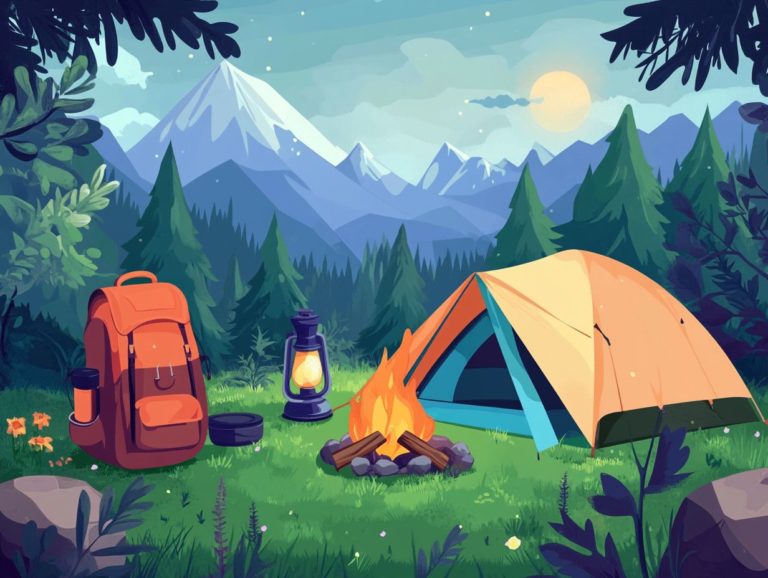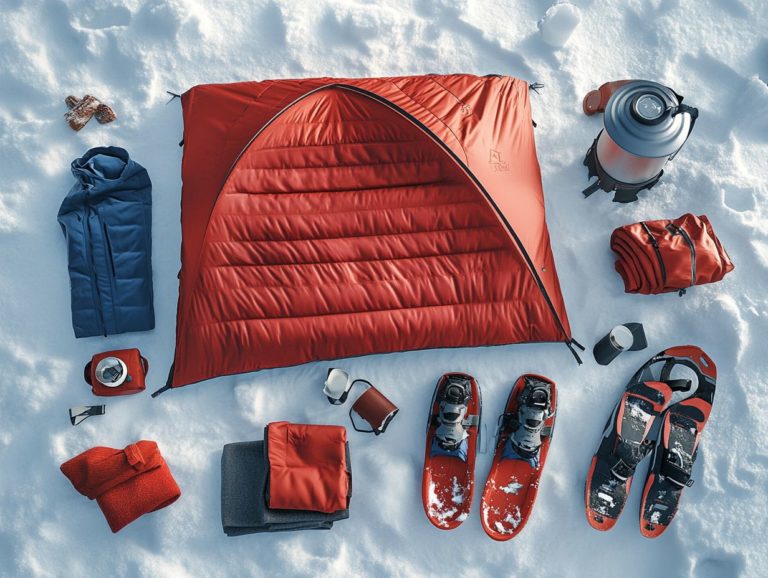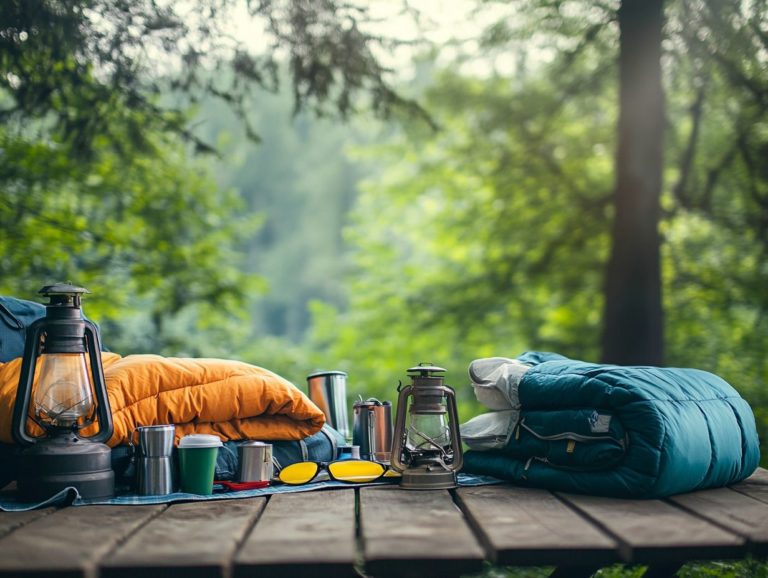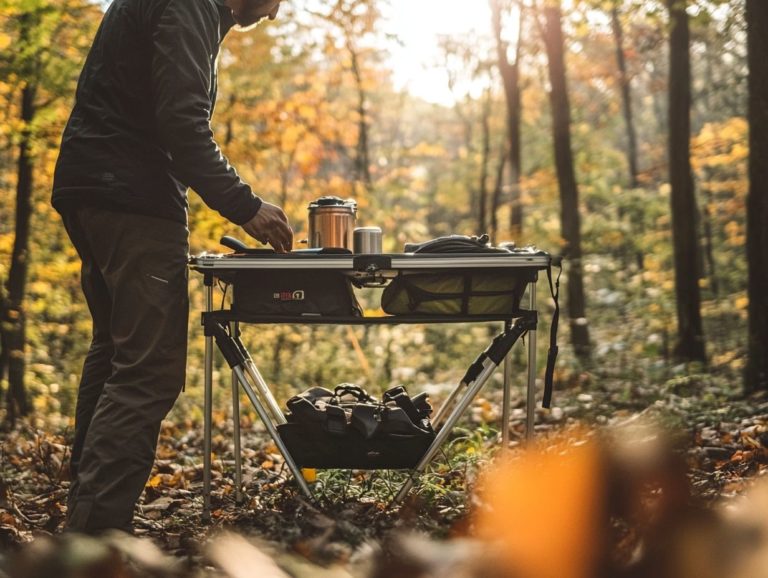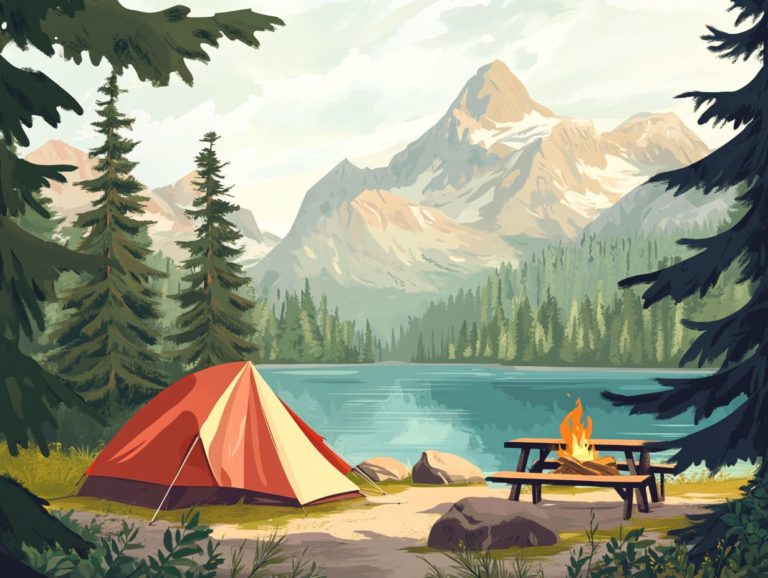Camping Safety Tips: What You Need to Know
Planning a camping trip can be an exhilarating adventure, but it demands meticulous preparation to ensure both your safety and enjoyment.
Get ready! This guide equips you with everything for a thrilling camping adventure, from essential items to pack and checking the weather to safely setting up camp and managing fire risks.
Wildlife safety is crucial; you’ll learn how to identify potentially dangerous animals and how to store your food properly.
You’ll also find personal safety tips for hiking and insights on emergency preparedness. Prepare yourself for a safe and unforgettable outdoor experience!
Contents
Key Takeaways:
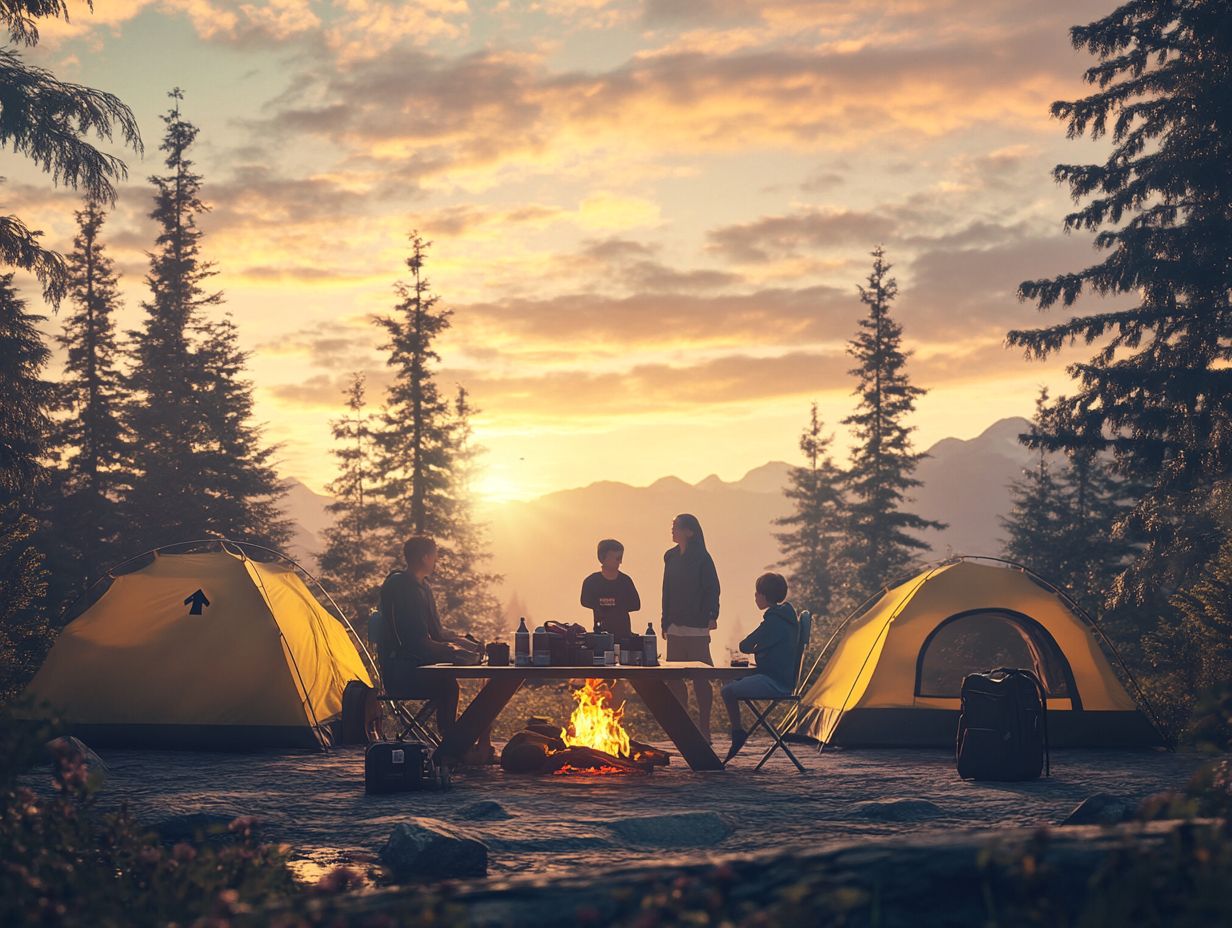
- Always check the weather and terrain before your camping trip.
- Set up your campsite properly and follow fire safety measures.
- Be aware of wildlife dangers. Store food securely and dispose of waste properly.
Preparing for Your Camping Trip
Preparing for your camping trip means embracing essential safety tips that will elevate your experience in the great outdoors. Consider factors like choosing the right camping gear, checking the weather forecast, and securing your camping reservations. These elements are crucial for a successful outing.
It’s wise to consult with your healthcare provider about any medications or allergies you may have, especially if you need an EpiPen for emergencies. By taking these precautions, you can enhance your safety while tent camping or indulging in recreational activities at national parks and RV parks.
Essential Items to Pack
When you’re preparing for a camping trip, it s essential to pack key items like a comprehensive emergency kit, a well-stocked first aid kit, and effective mosquito protection. These essentials will ensure your family’s comfort and safety amid the beauty of the wilderness.
Think about including safety gear such as a reliable flashlight with extra batteries, a whistle for signaling help, and a versatile multi-tool for unexpected tasks.
Cooking equipment is vital for any outdoor adventure; portable stoves, lightweight cookware, and biodegradable soap for easy cleanup will elevate your camping experience.
Don’t forget to pack a sturdy tent, comfortable sleeping bags, and a selection of games to keep everyone engaged and entertained. For those camping adventures, consider checking out what to bring for camping in national parks. Remember, health safety measures are non-negotiable—hydration is key, so water purification tablets make water safe to drink while you embrace the great outdoors.
Checking the Weather and Terrain
Before you set off on your camping adventure, it s crucial to check the weather forecast and get acquainted with the terrain to avoid hazards that could jeopardize your safety.
This means using reliable weather services and understanding alerts about temperature changes, chances of precipitation, and severe weather warnings. By staying informed about potential rain or wind, you can make smart decisions about what gear to bring and how to plan your activities.
Understanding the specific terrain helps you pinpoint risks like slippery slopes, unstable ground, or areas vulnerable to flash floods. Evaluating these weather conditions isn t just a good idea; it s essential for your enjoyment and overall safety during the trip.
Campsite Safety Measures
Implementing campsite safety measures is essential for creating a secure environment during your camping trip. This is especially important in areas where wildlife encounters and potential hazards could disrupt your experience.
By taking these precautions, you can fully immerse yourself in the beauty of nature while safeguarding your adventure.
Start planning your unforgettable camping trip today!
Setting Up Camp Safely
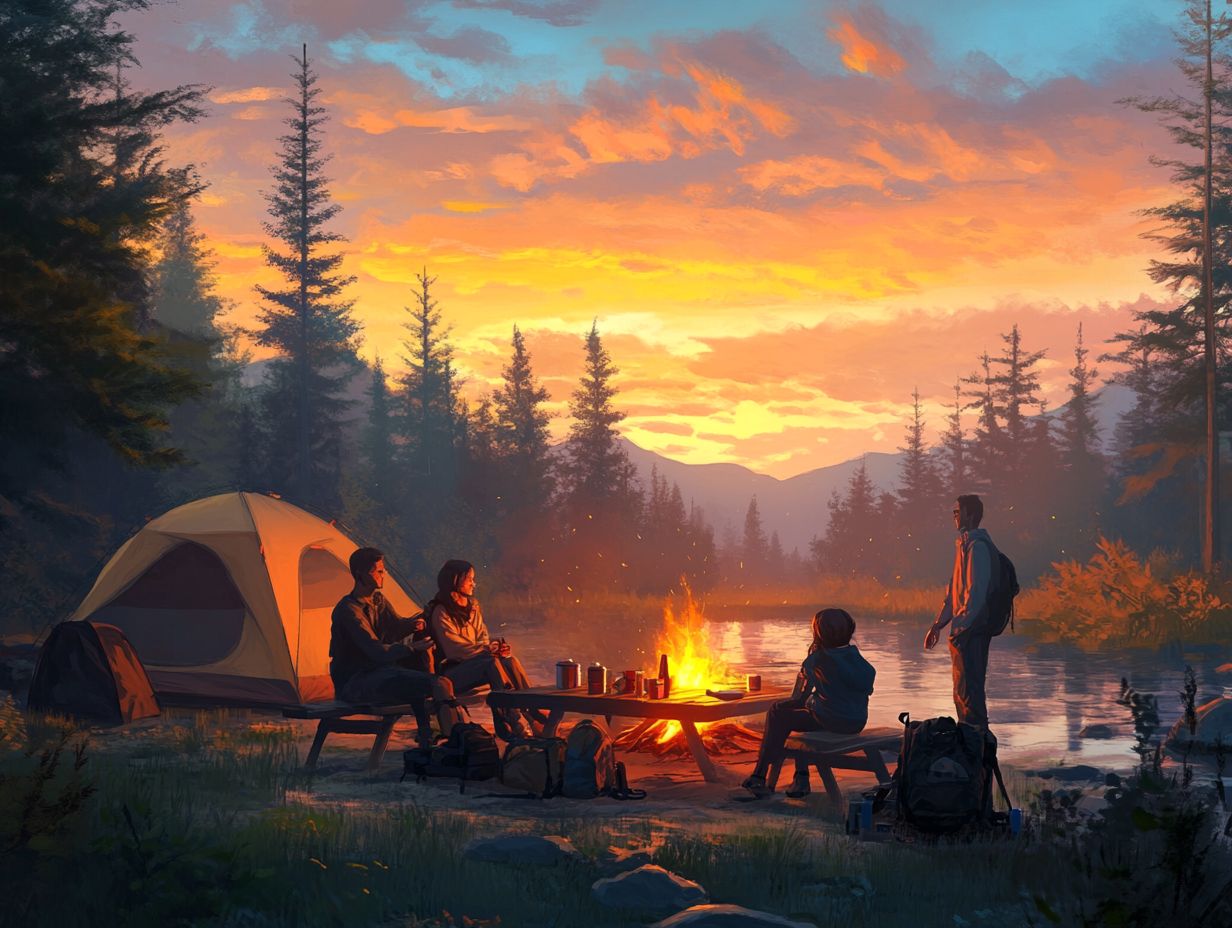
Setting up camp safely requires you to follow essential safety tips to secure your tents and camping gear. This is especially important when using picnic tables for food preparation and storage to ensure proper food safety.
By choosing a flat, dry spot for your tent far from hazards like overhanging branches or potential flood zones you’ll create a secure and comfortable sleeping environment. Placing your tent properly boosts stability and enhances the overall safety of your campsite.
When it comes to picnic tables, clean the surface thoroughly before preparing meals. This keeps those pesky animals away, ensuring your meals are worry-free!
Using bear-proof containers, which are special containers designed to keep bears away from your food, or hanging your food at least 10 feet off the ground can effectively keep unwanted wildlife at bay. This approach ensures a safe and enjoyable camping experience.
Fire Safety and Campfire Tips
Understanding fire safety is essential when you’re out camping. Improper campfire management can lead to the dangers of carbon monoxide and potential emergencies that could ruin your outdoor adventure.
Choose established fire pits to ensure safety. Keep flammable materials at a safe distance and always fully extinguish the fire before leaving the site.
Practice safe cooking techniques by using stable cooking equipment and monitoring temperatures to avoid food-related mishaps.
Be well-prepared with an emergency kit that includes essentials such as a first aid kit, flashlight, and fire extinguisher. Knowing how to use these items can make a significant difference in handling unforeseen situations during your camping trip.
Wildlife Safety
Wildlife safety is paramount when you’re camping, especially regarding potentially dangerous animals like bears and venomous snakes. These creatures can pose significant threats, making it essential to engage in careful planning and maintain a heightened awareness of your surroundings.
Identifying and Avoiding Dangerous Animals
Identifying and avoiding dangerous animals is crucial for ensuring your safety during outdoor adventures. Awareness of your surroundings helps to prevent unwanted encounters.
Recognize signs of animal activity such as tracks, droppings, or scratches on trees to determine if you re venturing into a high-risk area.
To minimize risks, select camping spots away from known animal paths and never leave food unattended. Properly storing your food in bear-resistant containers or hanging it high in trees can significantly decrease the chances of attracting wildlife.
Make noise while hiking to alert animals to your presence; this encourages them to steer clear, keeping both you and them at a safe distance.
Proper Food Storage and Disposal
Ensuring proper food storage and disposal is essential for maintaining food safety and preventing wildlife encounters during your camping adventures.
Utilize bear-proof containers, designed to keep curious animals away while safeguarding your food supplies. The importance of proper waste disposal cannot be overstated; leaving scraps or unsealed trash can attract unwanted visitors, risking your campsite and disrupting the natural habits of wildlife.
By adopting these best practices, you can fully enjoy your outdoor experiences while minimizing your ecological footprint and fostering a safe environment for both yourself and local wildlife.
Personal Safety Tips
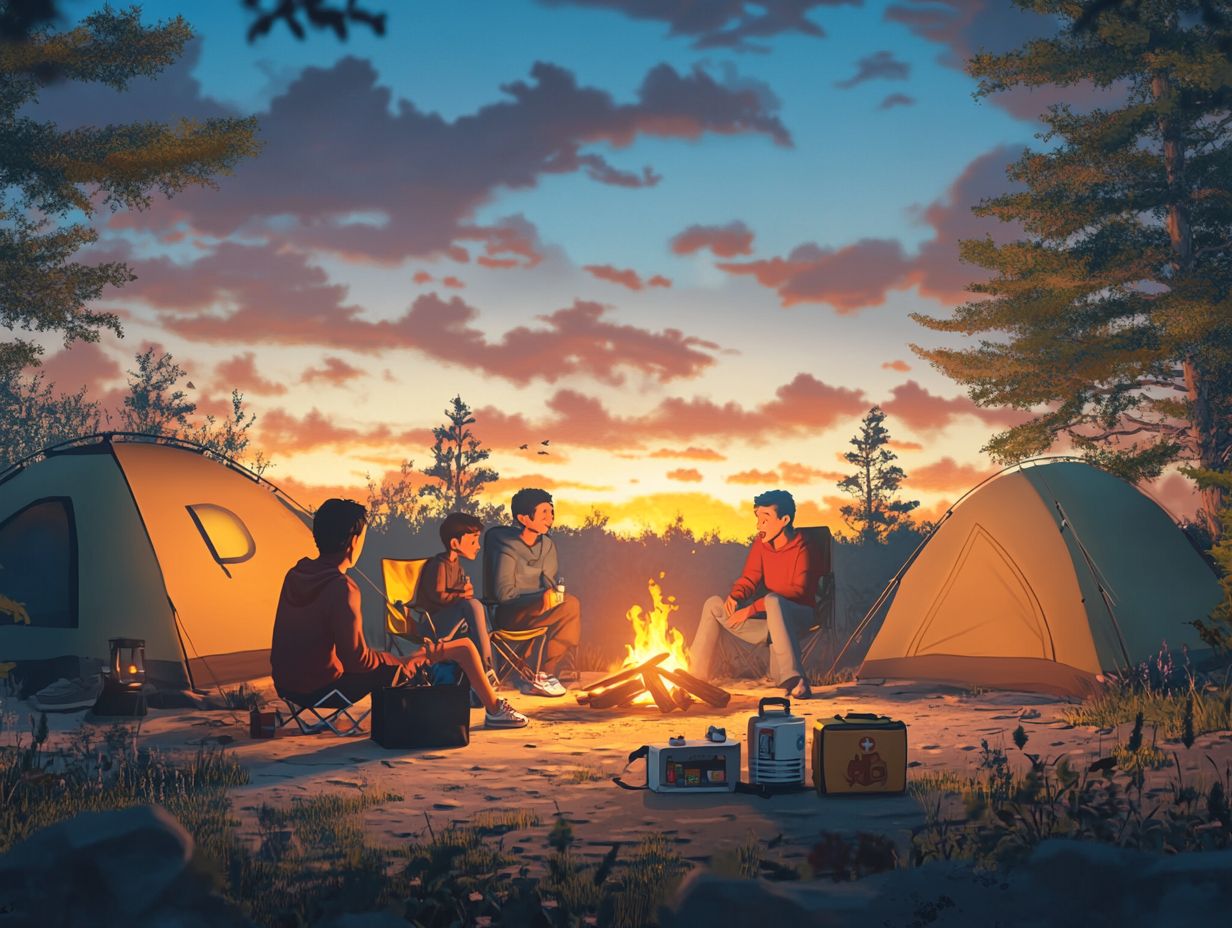
Personal safety tips are vital for enhancing your outdoor experience during a camping trip. They provide you with the knowledge and resources necessary to navigate emergencies with confidence and ease.
Stay informed about the weather and potential hazards to prepare effectively for your next camping adventure.
Don t wait! Equip yourself with these essential safety tips to ensure a memorable and safe camping experience!
Staying Safe on Hikes and Outdoor Activities
Staying safe on hikes and outdoor adventures requires careful planning and a strong commitment to camping safety. This ensures you can minimize risks while enjoying the stunning beauty of national parks.
Before you embark on any journey, take the time to thoroughly research and plan your hiking trail. Pay close attention to its length, difficulty level, and any potential hazards that may arise. For essential hiking safety tips, being prepared for different weather conditions is equally important, as sudden changes can impact your safety. Remember, proper hydration is crucial; staying hydrated helps keep your energy levels high and your focus sharp.
Equipping yourself with the right gear like sturdy shoes and a first-aid kit is vital for preventing injuries and handling emergencies. By prioritizing these important precautions, you can fully enjoy nature s beauty while staying safe.
First Aid and Emergency Preparedness
Being well-prepared with a fully stocked first aid kit and an emergency kit is crucial for your safety. This allows you to manage unexpected incidents calmly and efficiently.
When you venture into the great outdoors, the chance of facing minor injuries or surprises is high. To enhance your safety, especially in areas with wildlife, consider staying safe in bear country. Your comprehensive first aid kit should include:
- Antiseptic wipes for cleaning wounds
- Adhesive bandages in various sizes for cuts
- Gauze pads for larger wounds
- Medical tape to secure dressings
These essentials will help you effectively manage cuts and scrapes. Also, include pain relievers like ibuprofen or aspirin; they can be lifesavers for headaches and muscle soreness.
For more serious emergencies, your emergency kit should contain tools like:
- A multi-tool for various tasks
- A whistle to signal for help
- A flashlight for visibility
Also, include useful items such as a space blanket and fire starters. Having these basics handy not only boosts your safety but also gives you confidence as you explore.
Frequently Asked Questions
Here are some common questions about camping safety to help you prepare for your outdoor adventures:
What are some essential camping safety tips?
Essential camping safety tips include informing others of your plans, packing a first aid kit, familiarizing yourself with the area, and being ready for potential weather changes.
What should I do if I encounter wildlife while camping?
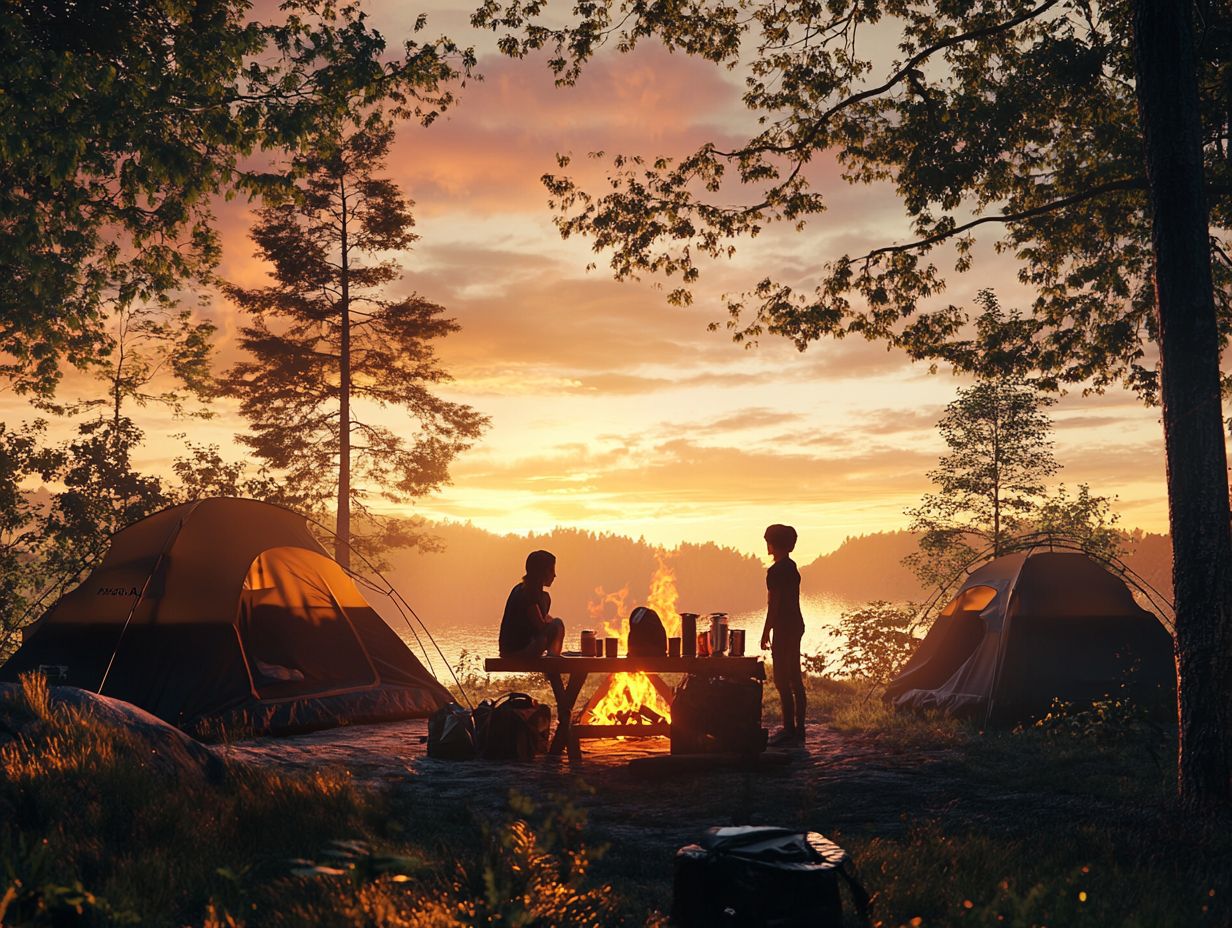
If you encounter wildlife while camping, remain calm and avoid sudden movements. Slowly back away while facing the animal and make loud noises to scare it off. Do not approach or feed wild animals.
What kind of gear do I need to ensure a safe camping trip?
For a safe camping trip, have a well-stocked first aid kit, a reliable communication device (like a cell phone or walkie-talkie), appropriate clothing and footwear for the weather, and a map of the area.
How can I prevent accidents while camping?
To prevent accidents, set up your campsite properly, follow safety guidelines when using equipment or cooking, stay hydrated, and be aware of your surroundings at all times.
What should I do in case of an emergency while camping?
In case of an emergency, stay calm and assess the situation. If possible, contact emergency services or use a signaling device to call for help. Follow first aid procedures and wait for assistance.
Can I bring my own firewood when camping?
It is not recommended to bring your own firewood, as it may introduce non-native insects or diseases. Instead, buy firewood from a local vendor or use fallen branches from the ground for your fire.

